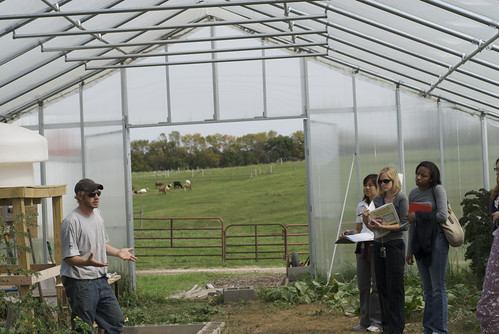
In September, I was one of 28 Junior Professionals and two advisors from USDA’s Foreign Agricultural Service (FAS) who traveled to the Midwest for an annual agricultural training trip. This training opportunity exposed members of FAS’s Junior Professional Advisory Committee (JPAC) to a broad range of U.S. agriculture in Minnesota and Iowa. The trip also helped maintain and build direct relationships with the U.S. agricultural industry, reinforcing the Agency’s connection to its primary constituents.
In Austin, MN, we toured Hormel’s meat processing facilities. Afterwards, we learned more about the company during a presentation and tour of the SPAM Museum. SPAM is by far the biggest product for Hormel, with strong export potential due to high demand from foreign markets. South Korea is currently the biggest overseas market for SPAM, but Hormel is also focusing its marketing on mainland Japan and China. One of the biggest challenges in its export market is SPAM education – teaching potential customers how to cook and prepare SPAM. In its effort to export to foreign markets, Hormel uses different flavors of SPAM, and its marketing campaigns vary to improve brand status within the respective export destinations.
Another highlight of the trip was a visit to Absolute Energy, LLC, a locally owned company with offices in Minnesota and Iowa that seeks to increase economic development in the local area, add value to corn production, provide a return on investments for investors, and reduce U.S. dependence on foreign oil. We learned a lot about the ethanol process and toured the grounds of the facility, which produces 120 million gallons of ethanol each year.
This geographical region presented a unique opportunity for our staff to observe the development, harvesting, processing, and marketing of major commodity crops, processed products meat, and horticultural products as well as operations at an ethanol plant, milling facility, port, and the Minneapolis Grain Exchange. Participants had the opportunity to learn more about the various types of agricultural businesses, from large companies like Cargill and Hormel, to family farms who are active participants in Community-Supported Agriculture (CSA) shares and farmers markets.
Our visit to the Midwest allowed us to personally witness how public and private partnerships are being utilized to increase U.S. exports and promote sustainable development in the agriculture industry both domestically and abroad. It was extremely beneficial to hear directly from those affected and the impact this has on their goals, both domestically and in the export market.

